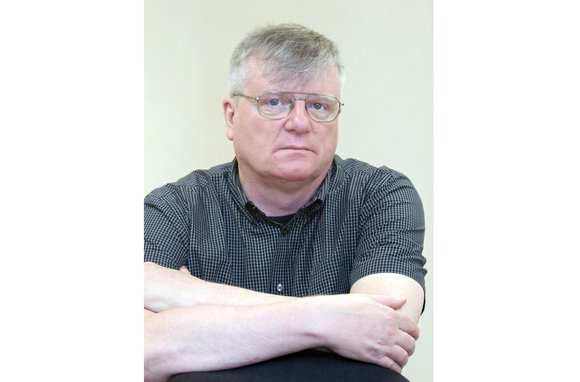Dallas researcher driven to protest, educate public about white supremacists
7/24/2015, 8:34 a.m.
Edward Sebesta calls it “a library of evil.”
He houses the collection in a room on the second floor of his Dallas home.
In it are thousands of books, magazines, newsletters, cassettes, DVDs, videos and other materials that Mr. Sebesta has collected from people and groups that support the Confederate cause, dating from pre-Civil War days to the present.
He uses the term neo-Confederate to describe supporters of white supremacy who seek to glorify those who fought against the nation during the Civil War to preserve slavery and portray the Confederacy in a positive light.
Mr. Sebesta, a 63-year-old Akron, Ohio, native, told the Free Press last Friday he indexes all the materials so he can provide information to scholars, authors, journalists and others researching neo-Confederate efforts.
From his research, Mr. Sebesta also has published numerous articles in academic journals on neo-Confederate groups since 1998. He visited Richmond last week to hold demonstrations during the Sons of Confederate Veterans weeklong national convention.
In addition to protesting at the statue of Robert E. Lee on Monument Avenue and talking with Confederate flag wavers outside the Virginia Museum of Fine Arts, he led a small group of sign-holding demonstrators outside the Museum of the Confederacy in Downtown on July 15, as SCV members and supporters gathered inside.
Mr. Sebesta said officials at the Museum of the Confederacy “enable” neo-Confederate efforts by lending their facilities to SCV members as well as members of the like-minded United Daughters of the Confederacy.
He also has lobbied Richmond area churches in recent years to reject hosting memorial services organized by the SCV and UDC to honor those who died defending the traitorous Confederate cause.
He said the SCV and UDC members support a “heritage that is hateful” and “sympathetic to the Confederacy.” He said they are “misguided.”
“You can tell they are people who just are not accepting the future,” Mr. Sebesta said. “There are a lot of people here still connected to the Confederacy. Metaphysically, Richmond is still the Capital of the Confederacy.
“The question is, where do we go from here?”
Mr. Sebesta said while some people taunt neo-Confederates and call them names, “I just try to talk calmly and present them with the facts” gathered from years of research.
He was first inspired to research the neo-Confederate movement in 1992, after seeing the movie, “Glory.” The film portrays the 54th Regiment Massachusetts Volunteer Infantry, the first formal African-American unit of the Union Army that gained acclaim for its heroic actions in a battle at Fort Wagner in Charleston, S.C.
“I never was comfortable with all that Confederate stuff,” he said.
An engineer by profession, Mr. Sebesta said he undertook an unsuccessful campaign to have a statue of Robert E. Lee removed from a park in Dallas and “was vilified” by critics.
He says he has called out “many mainstream” individuals, including former Virginia Gov. George Allen, who he says back neo-Confederate organizations such as the Council of Conservative Citizens.
He said he’d like to see the statues of Confederate traitors removed from Monument Avenue and put in a theme park designed to tell the history of race in this country.
Mr. Sebesta said he’d also support renaming Jefferson Davis Highway and eliminating Lee-Jackson Day as a state holiday.
And, he added, he’d like to see public schools in Richmond start teaching “the real history” of this country as it relates to the Civil War and neo-Confederates’ efforts to maintain white supremacy.







